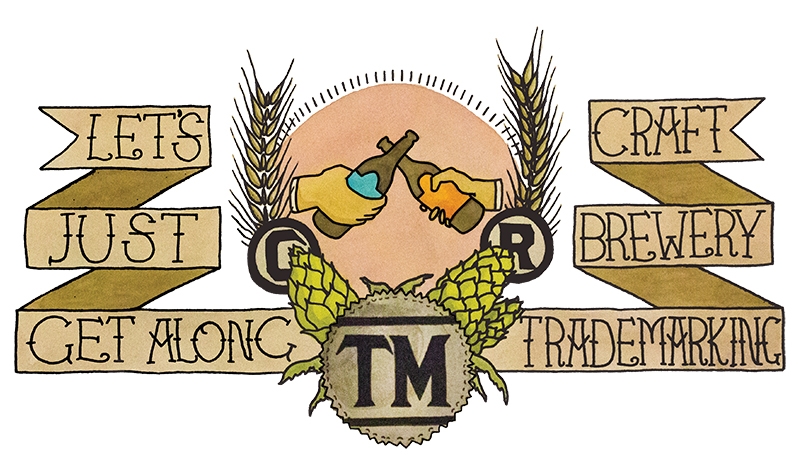Let’s Just Get Along: Craft Brewery Trademarking
Community
Illustration: Mason Rodrickc
The purpose of this piece (short of my need to vent) is to highlight some of these issues that have been affecting Utah breweries over the course of the last few years, marking a bit of a trend and, frankly, making the craft industry look bad. I understand the need for brand identity within the marketplace. I am even willing to concede that in some radical cases, brand re-development is necessary to avoid identity crisis. However, the following bullshit is simply confusing.
Even within our small brewing community here in Utah, we’ve seen a number of small brands get bullied or forced to back down by opposing litigation. Here are a few highlighted examples:
Powderhound Porter is now Powder Shot Porter
About five years ago, Desert Edge Brewery was issued a cease and desist order from Big Sky Brewery in Montana over the name “Powder Hound.” “We initially thought about fighting it, but decided against it,” says Desert Edge Head Brewer Chris Haas. Reason being: The small time brewpub only brewed this small, seasonal batch once a year, and couldn’t financially justify fighting it. The confusion over this was merely that Big Sky owned the trademark to “Powder Hound,” (in reference to a dog) and Desert Edge named their beer Powderhound (a ski reference).
Elephant DIPA is now Elephino DIPA
In 2011 Red Rock, a small brewpub with a newly established production facility, was producing one of SLC’s new favorite double IPAs, named Elephant. Then they realized that the name Elephant could be confused with the Carlsberg flagship beer dubbed the same name. Out of fear, they opted to change the name, knowing that if a massive brewery like Carlsberg wanted to sue, they could shut them down with legal fees alone.
Hop Notch is now Hop Nosh
In 2013, Uinta agreed to change the name of their fastest-growing national brand, Hop Notch, to Hop Nosh after Massachusetts-based brewery Notch Brewing claimed ownership over the “Notch” trademark. Their justified reasoning was “confusion in the marketplace.” Even with this debacle, I will hand it to Uinta: Even with the name changes they have encountered, they always manage to stay consistent with the packaging/artwork.
Not to go unnoticed, the US has seen many other examples of these trademark disputes. These disputes have ended in both mockeries of the industry and some gleaming examples of what the industry ought to be. As the previous examples are too depressing to dwell on, I wanted to highlight a name complication between Avery Brewing Co. (Colorado) and Russian River Brewing (California) that ended in the best way possible. About 10 years ago, both breweries had realized that they both had a Belgian beer on their lineup called Salvation. Soon thereafter, they got together and formulated a recipe merging the two brews to make a new beer altogether. It was aptly named, Collaboration Not Litigation. This showed the breweries’ willingness to come together for the sake of the craft and not dispute over the old “who called it ‘what’ first,” which would have resulted in a mess of legal issues.
My only question now is: Why can’t we all just get along, people? I’ve seen the collective Facebook and Twitter battles between breweries dragging their “loyalists” into the mess, and it is just a mockery to the industry. You make beer and we enjoy the beer—it’s as simple as that. If the need arises for a brewery to crack down on an opposing brewery for using the same name or slogan, I offer this question: Do you make the better product or does it really affect your sales? If yes to either of those, suck it up and be happy people are drinking. At the end of the day, I just hope that the product will speak for itself and these battles of litigation will stop. Of course, this is all presuming that the “Big Guys” are willing to play nice (unlikely).
